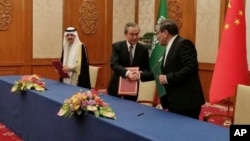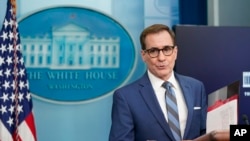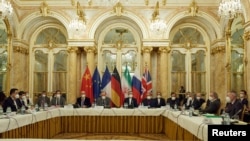Despite its rocky relations with China, the White House says it welcomes Beijing's efforts to help end the war in Yemen and de-escalate tensions in the region following the announcement of a Chinese-brokered deal that allows Iran and Saudi Arabia to reestablish diplomatic relations after seven years of hostility.
"If this deal can be sustained — regardless of what the interest was or who sat down at the table — if it can be sustained, and the war in Yemen can end, and Saudi Arabia doesn't have to continually try to defend itself against attacks from the Houthis who are funded and supported by Iran, in the end we welcome that," said John Kirby, National Security Council coordinator for strategic communications, in a briefing to reporters Friday.
At the same time, Kirby sought to downplay the development, underscoring that the U.S. has also worked on de-escalation through its own "effective combination of deterrence and diplomacy." He noted that the road map announced Friday in Beijing appeared similar to plans negotiated in Baghdad and Muscat in 2021 and 2022 that aimed to renew ties between the two rival Middle East powers, which the U.S. supported.
"It really does remain to be seen whether the Iranians are going to honor their side of the deal," Kirby added.
Tehran and Riyadh agreed to resume diplomatic relations and reopen respective embassies within two months, according to a statement issued by Iran, Saudi Arabia and China. "The agreement includes their affirmation of the respect for the sovereignty of states and the noninterference in internal affairs," it read.
Riyadh severed diplomatic ties with Iran in 2016 after demonstrators stormed its embassy in Tehran over the Saudi execution of Sheikh Nimr al-Nimr, a prominent Shiite Muslim cleric who was convicted of terror-related offenses.
For decades, the Saudi-Iran feud has fueled conflicts in the region. Reduced tensions between Riyadh and Tehran could have positive repercussions beyond Yemen, including in Lebanon, Syria and Iraq.
Diplomatic breakthrough
The deal struck in Beijing this week is a "major diplomatic breakthrough for Tehran, Riyadh and Beijing," said Robert Daly, director of the Wilson Center's Kissinger Institute on China and the United States. It is a "milestone for Chinese diplomacy," he told VOA.
The Saudi-Iran agreement was reached amid the perception among Gulf states that U.S. influence in Middle East is receding as Washington pours its resources into the war effort in Ukraine and U.S. strategic rivalry with China.
In an apparent jab at Washington in announcing the deal, Beijing said, "The world is not limited to the Ukraine issue."
"There are many issues related to peace and people's livelihood that require the attention of the international community and timely and proper handling by the parties concerned," Wang Yi, China’s senior foreign policy official, said in a statement.
Washington should use this as a wake-up call and reinvest in its own diplomacy, Daly warned.
"If America continues to be absent or underrepresented in world capitals and global fora, it will have only itself to blame," he said. "The Iran-Saudi deal did not result from some sneaky Chinese plot: China worked publicly and steadily for several years to achieve this end."
Riyadh's calculus
The Chinese-brokered deal is based on Riyadh's strategic calculus and does not mean it is choosing Beijing over Washington, said Alex Vatanka, director of the Iran program at the Middle East Institute. He pointed out that as Saudi Arabia aims for its "Vision 2030" blueprint to open the country, the Yemen conflict is putting off foreign investors and Riyadh is keen to end it.
"Who can help Saudi Arabia end the Yemen war? It's not the United States because the U.S. doesn't have leverage over Iran. It's China, which happens to be Iran's biggest trading partner," he told VOA.
Washington ended diplomatic relations with Iran in 1980 following the Iranian 1979 takeover of the American Embassy in Tehran. Despite Washington's heavy sanctions, it has little economic clout over the Islamic Republic.
Vatanka said it's unlikely this deal will affect Saudi and Gulf state relations with Washington, which will remain the region's security guarantor in the foreseeable future.
Following the announcement of the deal, some expressed hope that it could lead toward a path to get Tehran to return to the Iran nuclear agreement, formally known as the Joint Comprehensive Plan of Action.
"The Biden administration has been unable to convince the Iranians to come back into compliance. Maybe China can do this, too," said Barbara Slavin, a Middle East and North Africa distinguished fellow at the Stimson Center.
"If so, it would really show that China is no longer kind of a secondary player when it comes to major diplomacy in the Middle East and in the world at large," she told VOA.
Despite the Saudi deal with Iran, observers say Gulf states likely will continue to pursue closer ties with Tehran's rival Israel, including working toward diplomatic normalization through the U.S.-led Abraham Accords.
The White House said it fully supports Israel's integration into the Middle East region, including ultimately with Saudi Arabia.
"We have also established new formats for engagement," a National Security Council spokesperson told VOA, pointing to the Negev Forum between Israel's Abraham Accords and treaty partners and the I2U2 platform between India, Israel, the United Arab Emirates and the U.S. as "public examples of critical work that is otherwise going on behind the scenes."
NSC's Kirby would not confirm reporting that Saudi Arabia has informed the U.S. that it will sign on to the Abraham Accords if the administration agrees to provide Riyadh with additional security guarantees and help it develop a civilian nuclear program.
U.N. spokesperson Stephane Dujarric also welcomed the announcement.
"The secretary-general has expressed his appreciation to the People's Republic of China for hosting these recent talks and for promoting dialogue between the two countries," he said in a statement. "Good neighborly relations between Iran and Saudi Arabia are essential for the stability of the Gulf region."
Adrianna Zhang and Margaret Besheer contributed to this report.
Editor’s note: This story has been updated to correct the title of Wang Yi.






